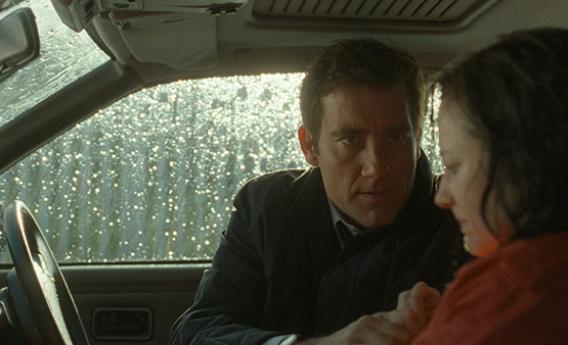The English director James Marsh is known primarily for his documentaries: Man on Wire, the Oscar-winning story of acrobat Philippe Petit’s legendary tightrope walk between the World Trade Center towers, and Project Nim, a harrowing account of the life of a chimp raised as a human and then discarded. But Marsh also directed the second film in the fine British serial-killer trilogy Red Riding—a densely atmospheric, slow-paced crime procedural whose remote Yorkshire setting was so faithfully evoked that much of the dialogue hovered on the edge of incomprehensibility. Marsh’s new film, Shadow Dancer (adapted by Tom Bradby from his own novel, and out in theaters and on VOD) returns to Red Riding’s brand of grim, tight-lipped regionalism, this time set not in 1980 Yorkshire but in 1990s Belfast, during the last years of the uprising against British occupation known as the Troubles.
Andrea Riseborough—a tiny live-wire of an actress last seen opposite Tom Cruise in Oblivion—plays Collette McVeigh, a member of a Belfast family that’s long been active in the Irish Republican Army. In the film’s opening scene, set in 1973, we see the preteen Collette (Maria Laird) watch, paralyzed in horror, as her younger brother dies after a street bombing. Twenty years later, Collette’s surviving brothers Gerry (Aiden Gillen, whom fans of The Wire will recognize as Tommy Carcetti) and Connor (Domhnall Gleeson, whom fans of Harry Potter know as Bill Weasley) are true-believer IRA radicals. Collette, the single mother of a young son, supports the cause, but ambivalently. In a tense, nearly silent sequence, she makes a failed attempt to plant a bomb in the London underground, but when she’s nabbed and interrogated by an MI5 agent, Mac (Clive Owen), she agrees to provide information in exchange for a plea bargain that will keep her out of prison.
Though Shadow Dancer isn’t without its share of spy-movie standbys—there are chases, assassinations, and one hard-to-watch torture scene—most of this quiet, deliberately paced film’s suspense is psychological: How long will Collette, who lives with her mother (the watchful Brid Brennan) and sees her brothers on a daily basis, be able to hide her new status as a mole? And will Mac be able to keep his promise to protect Collette, given that his chilly superior officer (a blonde, nearly unrecognizable Gillian Anderson) seems more than willing to let their reluctant informant hang out to dry?
The gray-green color palette (offset only by the bright red trench coat Collette wears throughout the movie, the one touch of the femme fatale accorded to this otherwise unglamorous spy) and the spare, defiantly unbombastic score by Dickon Hinchliffe (who also scored Red Riding and Project Nim) suit the project’s mood. Shadow Dancer is a matter-of-fact, unstylized political thriller that downplays almost to a fault the possibility of a romance between Owen and Riseborough. In fact, there are relatively few encounters between the two—most scenes feature the characters in their two separate worlds. The atmosphere within the McVeigh family—one of intense closeness and warmth, but also of constant surveillance and suspicion—is sharply evoked in brief scraps of dialogue (spoken in a profusion of brogues to whose authenticity I can’t begin to attest). But the confrontations between Mac and his heartless ex-turned-boss (of which there are many) sometimes fall flat, and for much of the film Owen is left standing around beige ’90s offices without enough to do.
For a film about an entire family willing to put their lives on the line for a cause, Shadow Dancer is remarkably nonideological. The McVeighs treat terrorism as a kind of family trade, planting bombs and plotting killings as a matter of honor and tradition rather than belief. Collette participates as much out of filial guilt as out of fear for her own and her son’s lives; the scenes in which her mother and brothers subtly prod her for signs of treachery make us feel her sense of entrapment and dread. Riseborough’s ever-mobile face is a study as Collette cycles from hopelessness to panic to mama-bear rage. Collette remains a bit blurry as a character, perhaps because she’s morally blurry even to herself. But our final glimpse of her face—which comes at the end of a pair of quietly shocking last scenes—leaves us with the woman in all her contradictions: duplicitous, devoted, regretful, resolute. It’s an unexpectedly bitter, irresolute note for a spy thriller to end on: Mata Hari looking out a car window, wondering what in the name of God she’s done.
